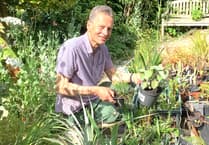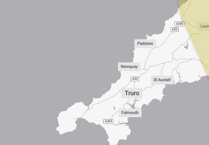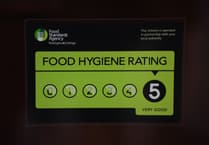REMEMBER the Poldark effect, when Cornwall was suddenly invaded by even more people than usual thanks to the popularity of the BBC series? Well, it’s happening again in Looe due to the success of another BBC drama, Beyond Paradise, which is filmed in the town.
Looe may look perfect – and in many ways it is – but there’s another side of the town that’s not quite Beyond Paradise.
Like so many coastal towns in Cornwall, there are problems with housing, economic and social deprivation, the death of the fishing trade and even loneliness. Looe has its own unique problems too – there have been four landslides in the past five months, the coastal path by the town has a hole in it and, of course, Looe is infamous for its floods, which are the bane of local traders.
There’s no one better equipped to explain life in Looe – both its pros and cons – than Armand Toms. He’s lived in the town all his life and has been an independent Cornwall councillor for 21 years. Anyone who has seen him speaking in the council chamber in Truro will know how passionate and protective he is of the Looe area.
Meeting me at the harbour car park, he said: “It’s a brilliant community – during Covid there were 200 volunteers helping people, that legacy has carried on.”
He took me a couple of hundred yards up the road to The Haven, the headquarters of Boundless, a trust which is doing myriad things to help every generation in Looe.
It provides a welcome space and community larder on Mondays and Thursdays, a children’s club and youth club on Wednesdays, knit and natter for older residents on Thursday mornings and Boardmasters, an adults board games club for the community, on Thursday evenings. If that wasn’t enough it also provides a community meal at the Millpool Centre on the last Wednesday of every month.
Run by Barney and Sara Barron, Boundless also organises the delivery of meals throughout the community on Wednesdays and Sundays, with volunteer drivers taking much-needed hot food to around 50 of the town’s elderly and infirm population. It also runs as a satellite project for Liskeard & Looe Foodbank.
The Haven – which overlooks the harbour – has a community fridge / freezer where food donated by the Co-op is offered free. “Anyone can come and get it,” said Barney. “There’s no shame in coming in if you are in need of food.”
Sara points out that the cost of living crisis is very real in Looe with five times more food parcels being delivered this year compared to last year. “We also have a hardship fund which can help people with everything from school uniforms to travel and to help fuel poverty,” she added. “That’s being used a lot more.”
Boundless also gifts Christmas presents to those in need, helping 200 families last December.
“The main industry here is tourism,” said Barney, “so you’ve got zero hours contracts, low pay and people working long hours in the summer. Shops reduce staffing in the winter because there’s not enough people. In a place like Looe poverty’s very much hidden, but it’s very much here.”
The Barrons and Armand agree that limited public transport – “buses just don’t run enough” – adds to the problems in Looe, a town where the nearest large supermarket is a 20 minute drive away.
There is a lack of suitable housing for people, with a caravan park just outside the town currently being occupied by around 30 people who have found themselves homeless. “A lot of these people are escaping trauma or experiencing trauma and don’t have any transport or money, because their benefits have yet to come through,” added Sara.
She said in many ways it was irrelevant how much money people have as one of the main issues in a coastal town like Looe is loneliness, which can affect anyone. That’s often exacerbated by the unique geography of Looe, with its hills and houses with steep steps meaning many elderly and infirm people are unable to leave their homes.
The trust’s 32 volunteers do all they can to check in on people, over and above delivering their meals.
“Boundless is not just about economic poverty, it’s about wellbeing,” say Barney and Sara. “We probably see about 100 people a week across the board. We work with the community rather than for them – it’s a catalyst for the community to help each other.”
Armand added: “What Boundless has done is take that community spirit which started during the pandemic and taken it to the next level.”
Around five restaurants and cafés in Looe help with the community meals scheme, one of which is the historic Golden Guinea pub just down the road on Fore Street. The pub, which dates back to the 16th century, provided 53 meals to people in the town the night before my visit.
“We started it during Covid and carried on doing it. They’re for the elderly and people who are struggling, and we also do a menu for children,” said assistant manager Carlie Johnston.
Callum Smith recently joined the pub after two months of being jobless. “It’s really hard to find work,” he said. “Everyone struggles out of season. Businesses reduce hours. It’s hard. Looe’s so heavily reliant on tourism – there’s not much else in the area.”
Reflecting a Cornwall-wide housing crisis, Callum is currently sleeping on a sofa at a mate’s place.
Armand says there is a “significant number” of Airbnb properties in Looe (a quick look online finds about 250) at a time when there’s a growing housing need. There are currently over 220 people / households on Cornwall’s Homechoice Register needing accommodation in Looe, compared to just 45 in 2018.
As we passed East Looe Beach, looking up at the properties above, Armand said: “Lots of them are Airbnbs. There are a lot of flats which are let out, many of them are holiday lets. You only have to walk around all the streets to see the amount of key safes on the cottages.”
“The trouble is Airbnb is so lucrative,” said the councillor, “though it does appear to be dropping off a bit now. It impacts the neighbours – holidaymakers understandably want to holiday at night and that upsets people living next door.”
Another bugbear of Armand’s is the controversial increase in tariffs at the council-owned car parks. “They are handy for people popping in to use the shops, but the Millpool car park is now too expensive for a lot of people. It seems to be pushing some people away from Looe.”
As we chat, Armand (his mother was Belgian hence the unusual name for a man with a fine Cornish accent) has to continually break off to speak to people he knows. It can take him over three hours to walk through the town. It’s no surprise – he can trace his family back 18 generations to Polperro, Talland and Looe, so this area is his lifeblood.
In many ways, Looe seems to be thriving. Armand points out the large amount of independent shops and a growing number of restaurants. There are noticeably less empty shops than in many other Cornish towns. With his local knowledge, Armand is quick to point out that almost all of the empty premises will soon be filled by new businesses.
One shop, opposite East Looe Beach, is run by Jamie Pearn, who is in his 20s and a town councillor. He hopes to resurrect the town’s chamber of commerce. “There are a lot of people like Jamie doing their best for Looe,” said Armand.
Paul Welshman runs the Knottershop gift shop on Buller Street. He’s lived in Looe all of his life. “It’s all changed – the fishing fleet’s gone but there’s now a bustling café culture. People moan about visitors and traffic, but this is Cornwall. There are a lot of holiday lets – I live in Liskeard, I couldn’t afford to live here – but we wouldn’t have a shop without those holiday lets.”
Like many towns, the banks have gone but a banking hub has been set up at the post office for residents, and most of the banks bring a weekly mobile service to the town. Armand’s quick to point out organisations which help local people – the sailing club holds free taster sessions for young people and the gig club is popular too; the men’s team are the current world champions.
Armand, who was a trawler fisherman for 25 years, is saddened by the decline of the fishing trade. He points out a trawler for sale in the harbour. “If that goes, we’ll be down to about five boats.” There were 33 in the 1980s.
For every negative there appears to be a positive. “People are investing in the town,” he says as we walk past a new Greek restaurant near Pengelly’s fishmonger, which recently expanded. Looking across the water to the Portbyhan Hotel, Armand added: “That place has been a bonus for the town – busloads of visitors come in to stay there all year round.
“We are never going to be the largest tourist resort, but we do the best with what we’ve got.” As he shook my hand and left me to buy a magnificent oggy from Sarah’s Pasties, Armand added: “People prove that they care about each other in Looe.”





Comments
This article has no comments yet. Be the first to leave a comment.